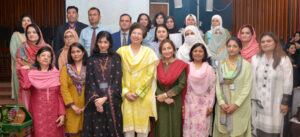The International Islamic University Islamabad (IIUI) hosted the “Less Talk, More Action: Changing the Course of Women’s Academic Leadership” international conference. This transformative three-day event, held in collaboration with the Higher Education Commission Pakistan (HEC), brought together a diverse assembly of academic luminaries, shedding light on the path to advancing women’s academic leadership.
 Academic luminaries gathered for the opening ceremony of the international conference, setting the tone for what would be a transformative event. Dr. Samina Malik, the Rector of IIUI, emphasized the importance of inclusivity and collaborative discussions, which were the cornerstone of the conference. The event went beyond mere paper presentations, incorporating voices from diverse backgrounds, including academics, organizations such as ILFABET and HRDN Pakistan, and international keynote speakers.
Academic luminaries gathered for the opening ceremony of the international conference, setting the tone for what would be a transformative event. Dr. Samina Malik, the Rector of IIUI, emphasized the importance of inclusivity and collaborative discussions, which were the cornerstone of the conference. The event went beyond mere paper presentations, incorporating voices from diverse backgrounds, including academics, organizations such as ILFABET and HRDN Pakistan, and international keynote speakers.
The conference featured international keynote speakers who brought invaluable insights to the table. The University of Newcastle’s Professor Penny Jane Burke, Director of the Centre of Excellence for Equity in Higher Education and the Global Innovation Chair of Equity, took the stage. Her address resonated with the praxis of justice in academic spaces. Professor Sara Aiston, Professor in Public Policy at Teesside University, uncovered the insidious ways of silencing in academia and the need to empower women to overcome unjust treatment. Ms. Robeela Bangash, in her keynote address, stressed the importance of training that equips women to identify and combat both micro and macro inequities, including issues like cyberbullying. Dr. Samina Amin Qadir highlighted the necessity of not only imparting skills to women but enabling them to be influential and implement their decisions effectively.
The conference featured panel and round table discussions that foregrounded critical issues, such as masculinization in academia and the passivity of women while emphasizing the need to overcome perceived vulnerabilities. They highlighted the importance of mutual support among women, debunking negative lobbying stereotypes, and promoting inclusivity and transparency. Participants stressed the importance of fostering the professional growth of both men and women based on merit and equality, with safeguards against slander and false accusations of harassment.
 Addressing the need for academic rigour and originality in research, the conference committee had subjected the submitted papers to a rigorous peer-review. Out of 42 papers, only 14 were selected for presentation. Asma Aftab received the “Best Research Paper Award” for her paper titled “Women’s Voices: At the Crossroads of Academy and Activism.” Her work challenged traditional boundaries and highlighted the interconnectedness of academic and activist roles. The papers included in the conference underscored the underrepresentation of women in leadership roles, the impact on institutional outcomes, and the need to address issues like gaslighting while also offering insights into forging indigenous and decolonial models of academic leadership based on non-western intellectual insights and cultural values.
Addressing the need for academic rigour and originality in research, the conference committee had subjected the submitted papers to a rigorous peer-review. Out of 42 papers, only 14 were selected for presentation. Asma Aftab received the “Best Research Paper Award” for her paper titled “Women’s Voices: At the Crossroads of Academy and Activism.” Her work challenged traditional boundaries and highlighted the interconnectedness of academic and activist roles. The papers included in the conference underscored the underrepresentation of women in leadership roles, the impact on institutional outcomes, and the need to address issues like gaslighting while also offering insights into forging indigenous and decolonial models of academic leadership based on non-western intellectual insights and cultural values.
A significant outcome of the conference was the “Women Empowerment Policy.” Prepared by Dr. Asma Mansoor in consultation with Dr. Samina Malik, the first woman Rector of IIUI, and peer-reviewed by national and international scholars including Dr. Osama Siddique, Dr. Sarah Aiston and Dr. Muneera Bano, the policy offers a roadmap for future endeavours in strengthening women in academic leadership roles. Vowing to push this policy forward, Dr. Samina Malik emphasised that such efforts are to the credit of IIUI and the HEC as they collectively take up the mantle to mitigate the toxicity plaguing academia and making it a safe space for the growth of women academic leaders by setting in place safeguards that ensure justice, transparency and merit. Acknowledging that this is an uphill task, nevertheless, she stated, this project is an initial step in the right direction.
The closing ceremony featured distinguished guests, Prof. Dr. Bushra Mirza and Prof. Dr. Haroona Jatoi, who acknowledged the importance of such events in paving the way for safer academic spaces for women. Dr. Haroona Jatoi praised Dr. Samina Malik and Dr. Asma Mansoor for their remarkable success in leading this significant project. She highlighted the need to establish a Gender Studies department and envisioned substantial growth opportunities for IIUI under its first-ever female rector’s leadership. Dr. Bushra Mirza emphasized the global trend of women leading top-ranking universities and stressed the importance of an inclusive approach that involves men as partners in mutual growth. Both guests commended Dr. Samina Malik and emphasized that women themselves are the initiators of change.
Dr. Samina Malik and Dr. Asma Mansoor lauded their team’s efforts and highlighted the support provided by partner universities like Fatima Jinnah Women University, Rawalpindi. They also emphasized the significance of continued discussions and inclusive dialogues between men and women in academia.
The conference received enthusiastic participation from students who raised thoughtful questions and expressed their hopes for more inclusive debates in the future. The event concluded with tokens of appreciation presented to the guests.

